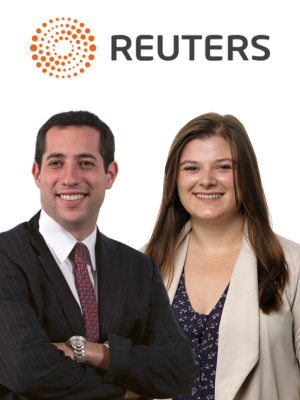“SEC administrative enforcement process called into question, highlighting importance of private actions” by Jonathan D. Uslaner Published in Reuters
November 27, 2023

In this Reuters article, “SEC administrative enforcement process called into question, highlighting importance of private actions,” BLB&G Partner Jon Uslaner and Associate Chloe Jasper consider SEC v. Jarkesy, an upcoming case on the Supreme Court's docket. The Court’s ruling will determine whether to disable the Securities and Exchange Commission's administrative enforcement proceedings, one of the major enforcement mechanisms targeting securities fraud in the United States.
Jon and Chloe provide background on the case, beginning with the SEC’s initial investigation of Jarkesky, a founder of two hedge funds, and his investment adviser, Patriot28, for misrepresenting the funds’ investment strategies. The SEC later brought an administrative proceeding against Jarkesky before an administrative law judge (ALJ), who ruled that he and Patriot28 had violated the Securities Act, the Exchange Act, and the Advisers Act. The SEC also issued its own decision, which included an imposed cease-and-desist order and a $300,000 penalty on Jarkesky and Patriot28. Jarkesky brought the case to the 5th U.S. Circuit Court of Appeals, arguing that SEC administrative proceedings were unconstitutional, and the 5th Circuit ruled in Jarkesky’s favor. The SEC then appealed the 5th Circuit’s decision to the Supreme Court, where the case is set to be heard later this week.
Support for a ruling in favor the SEC is currently divided. Groups of administrative law scholars and the ABA have filed amicus briefs in support of the SEC, while attorneys general from 18 states and high-profile individuals like Mark Cuban and Elon Musk have filed briefs in support of Jarkesky.
While this case calls into question the two major mechanisms that investors rely on for the deterrence and punishment of securities fraud—SEC enforcement actions and private securities actions brought by the injured shareholders themselves—a decision against the SEC would not leave investors wholly unprotected. According to the authors, “[n]o matter which way the Court rules, the SEC will still have authority to bring enforcement actions in federal court.”
The case continues the important conversation about the extent to which corporations can or should be held accountable. The official ruling is set to be issued next year.
External Link (link will open in a new window):
Click the link or access the PDF under "Related Documents" to read the full article.
